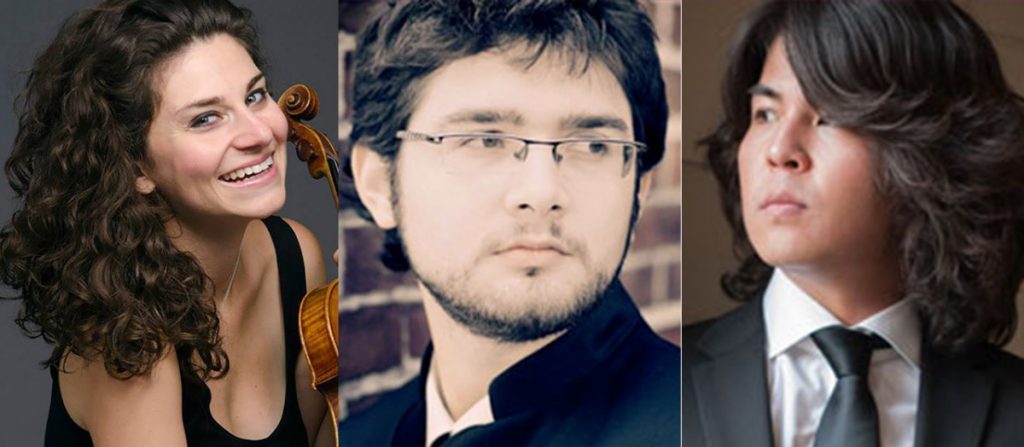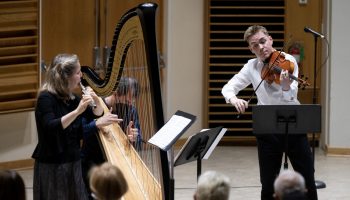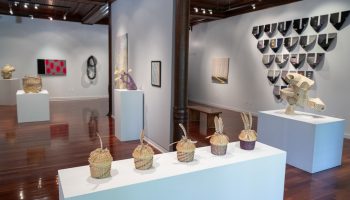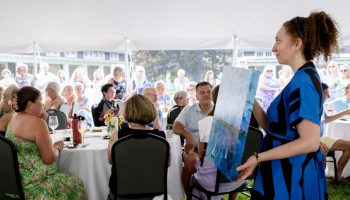
Enrique Granados was terrified of drowning, but his desire to perform led him to the sea.
His 1911 masterpiece, Goyescas, is a piano suite inspired by the paintings of Francisco Goya. Five years later, it was adapted into an opera that received its premiere in New York City. Originally from Spain, Granados embarked on his first-ever ocean voyage to play in America.
After conquering his American debut, Granados set sail for France. Somewhere along the English Channel, his ship was hit by a German submarine. He and his wife both drowned.
While Granados might be best known for the irony of his death, Diana Cohen, violinist and founder and co-artistic director of ChamberFest Cleveland, is more focused on what the composer left behind: his “beautiful, unfinished and rarely played Violin Sonata.”
Cohen and her husband Roman Rabinovich, a pianist, will bring the sonata to CHQ Assembly’s Video Platform at 4 p.m. EDT Monday, July 6. Joining them for a second piece is cellist Dongkyun An.
“(Granados’) sonata is like a short story, because you get a huge range of emotion and go from one to another very quickly through one movement,” Cohen said. “You feel like you get to have it all with this piece. Roman and I don’t feel it gets enough recognition for that.”
ChamberFest Cleveland was launched in 2012 by Cohen and her father, Cleveland Orchestra principal clarinet Franklin Cohen. It was intended to create thematic programming for unique chamber music — a performance style that features a small group of musicians with individual roles.
However, Cohen said the virtual component created space for a “new goal.”
“All of a sudden, we had to take into account what pieces would be easier for someone to take in over the internet,” Cohen said. “That’s harder than it sounds, but it also creates an opportunity to include pieces you might not have otherwise.”
To conclude, An will join Cohen and Rabinovich for Felix Mendelssohn’s Piano Trio No. 2 in C minor, Op. 66, which was composed in 1845. The work consists of four movements scored for a standard piano trio consisting of violin, cello and piano.
The opening movement is cast in a traditional sonata form, with the first theme featuring a foreboding “dark and stormy” emotional tone, Cohen said, indicative of Mendelssohn’s harmonic style.
In the way the piece is orchestrated, Cohen said she believes Mendelssohn wanted the trio to “play the piece like an organ.”
“It is so lush and passionate and dramatic,” Cohen said. “The intensity of the opening meets a much softer end, which takes you to various places as a listener. Suddenly, you hear a soft but very famous church hymn that becomes more and more grand throughout. This is one instance in chamber music where I really feel like I am playing in an orchestra.”
For those reasons, Cohen said the piece is an “audience favorite.”
“People always enjoy hearing the passion in this one, so it felt appropriate to give them something we know they will appreciate as much as we do,” she said.
The trio had to re-record the program three times, a lofty feat as Mendelssohn’s piece clocks in at 30 minutes long on average. Along with a re-do caused by a bow mishap, Cohen said she was met with an unfamiliar struggle.
“In our previous lives, we had performances and then we had recording sessions — now, they are constantly combined,” she said. “Recording sessions notoriously make people uptight and it takes a certain mindset to perform when you are recording. Many of us get bent out of shape about being perfect because we spend our lives listening to records that have been edited over and over again.”
It’s “all worth it in the end,” according to Jacqueline Taylor, Cleveland ChamberFest’s co-executive director.
“The beauty of it is that the music is what actually gets us to try to adapt,” Taylor said. “If it weren’t for Mendelssohn, we would have no reason to put all of this effort in. It is the end result of hearing a beautiful piece come together that makes us want to figure out how to bring it to life.”
This program is made possible by Jeff and Norma Glazer.




